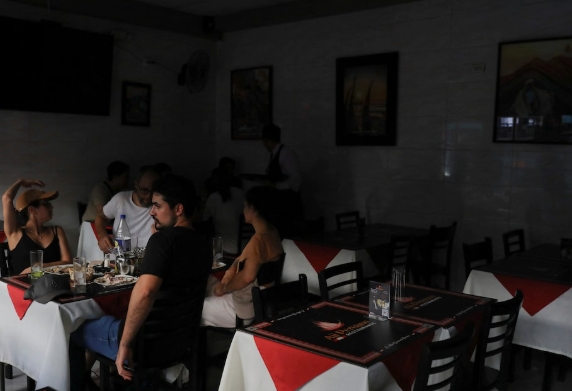
People sit inside a restaurant after a large power outage struck vast swaths of the country, in Santiago, Chile February 25, 2025.
A widespread power outage struck Chile on Tuesday, February 25, 2025, leaving the capital, Santiago, without electricity and impacting major copper mines in the northern region. The blackout, caused by a transmission line failure in the north, affected areas from Arica to Los Lagos. Interior Minister Carolina Toha confirmed the cause and dismissed speculation of a cyber attack. As a result, the government declared a state of emergency and imposed a curfew from 10 p.m. to 6 a.m. (0100 to 0900 GMT) across the affected regions.
In Santiago, streetlights went out, and emergency vehicle sirens echoed through the city, as reported by Reuters witnesses. The Santiago metro, a key transport system for millions, shut down, with passengers evacuated from stationary trains. Jose Luis Orlandini, a resident dining in downtown Santiago, described the situation: “There's nothing. There's no cash. No money. Nothing.” To maintain order, the interior ministry deployed armed forces nationwide.
Ernesto Huber, head of Chile’s National Electricity Coordinator (CEN), stated that power restoration had begun in some northern and southern areas, though no exact timeline for full recovery was available. By Tuesday night, electricity returned to parts of Santiago, including the civic center near the Moneda presidential palace, as well as coastal cities like Valparaiso and Vina del Mar. Huber noted: “We've activated several power stations, mainly hydroelectric stations,” while investigations into the outage’s cause continued. CEN planned to release a detailed update at 9:30 p.m.
The outage disrupted operations at significant copper mines, critical to Chile, the world’s leading copper producer. Escondida, the largest copper mine globally, lost power, according to a source cited by Reuters. Codelco, the state-owned mining company, reported that its Chuquicamata, Andina, Salvador, and El Teniente mines were without electricity, while other facilities switched to backup generators for limited operations. Private firms Antofagasta and Anglo American confirmed their mines were running on generators.
The blackout spanned from the mining-heavy north to the populous central and southern regions, as outlined by Chile’s national disaster prevention and response service, SENAPRED, which reported no emergency incidents. Santiago’s Arturo Merino International Airport continued functioning, though LATAM Airlines indicated potential flight disruptions. Toha expressed optimism about recovery, stating: “We hope that what we've been told will happen, that in the next few hours we'll have electrical service back.” She added that alternative measures would be considered if delays occurred.
Efforts to restore power continued, with companies aiming to resolve the issue swiftly. The event sent ripples through global metal markets due to Chile’s pivotal role in copper production, though no further disruptions beyond the outage were noted.